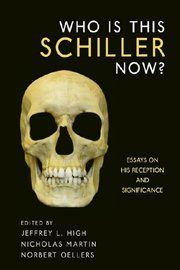Book contents
- Frontmatter
- Contents
- Foreword
- Acknowledgments
- List of Abbreviations
- Introduction: Why Is This Schiller [Still] in the United States?
- Part I Schiller, Drama, and Poetry
- Part II Schiller, Aesthetics, and Philosophy
- Part III Schiller, History, and Politics
- 12 Schiller und die Demokratie
- 13 God's Warriors, Mercenaries, or Freedom Fighters? Politics, Warfare, and Religion in Schiller's Geschichte des Dreyßigjährigen Kriegs
- 14 Who Is This Black Knight? Schiller's Maid of Orleans and (Mythological) History
- 15 Religion and Violence in Schiller's Late Tragedies
- 16 So Who Was Naive? Schiller as Enlightenment Historian and His Successors
- Part IV Schiller Reception — Reception and Schiller
- Part V Schiller Now
- Notes on the Contributors
- Index
12 - Schiller und die Demokratie
from Part III - Schiller, History, and Politics
Published online by Cambridge University Press: 05 February 2013
- Frontmatter
- Contents
- Foreword
- Acknowledgments
- List of Abbreviations
- Introduction: Why Is This Schiller [Still] in the United States?
- Part I Schiller, Drama, and Poetry
- Part II Schiller, Aesthetics, and Philosophy
- Part III Schiller, History, and Politics
- 12 Schiller und die Demokratie
- 13 God's Warriors, Mercenaries, or Freedom Fighters? Politics, Warfare, and Religion in Schiller's Geschichte des Dreyßigjährigen Kriegs
- 14 Who Is This Black Knight? Schiller's Maid of Orleans and (Mythological) History
- 15 Religion and Violence in Schiller's Late Tragedies
- 16 So Who Was Naive? Schiller as Enlightenment Historian and His Successors
- Part IV Schiller Reception — Reception and Schiller
- Part V Schiller Now
- Notes on the Contributors
- Index
Summary
Schiller's universal history lecture “Die Gesetzgebung des Lykurgus und Solon” (The Legislation of Lycurgus and Solon, 1789) stands in the shadow of his larger historical writings and is generally accorded only glancing attention. In this article I seek to redress this injustice; I will show how Schiller formulates — with recourse to Locke and Montesquieu — his constitutional ideal: representative popular sovereignty. The following study addresses, for the first time, Schiller's commitment to democracy by proxy, and his thoughts — in the words of Thomas Mann — “Vom kommenden Sieg der Demokratie” (On the Coming Victory of Democracy, 1938). In this sense, Schiller's “legislation” lecture also offers a bridge between the eighteenth and twenty-first centuries and reveals an unforeseen timeliness: Schiller, citizen of his age, on the road to a modern constitutional state.
IN DER UNIVERSALHISTORISCHEN Vorlesung “Die Gesetzgebung des Lykurgus und Solon” (1789) entwirft Schiller unter Rückgriff auf Locke und Montesquieu sein verfassungsrechtliches Ideal: die repräsentative Demokratie. Das Adjektivum — “demokratisch” — ist in Schillers Œuvre nur durch eine einzige Textstelle belegt. Beachtenswert ist dabei: im Fiesko (1783), dass die unmittelbare, direkte Demokratie mitsamt ihrer Gefährdungen zur Anschauung gelangt.
- Type
- Chapter
- Information
- Who Is This Schiller Now?Essays on his Reception and Significance, pp. 205 - 216Publisher: Boydell & BrewerPrint publication year: 2011



